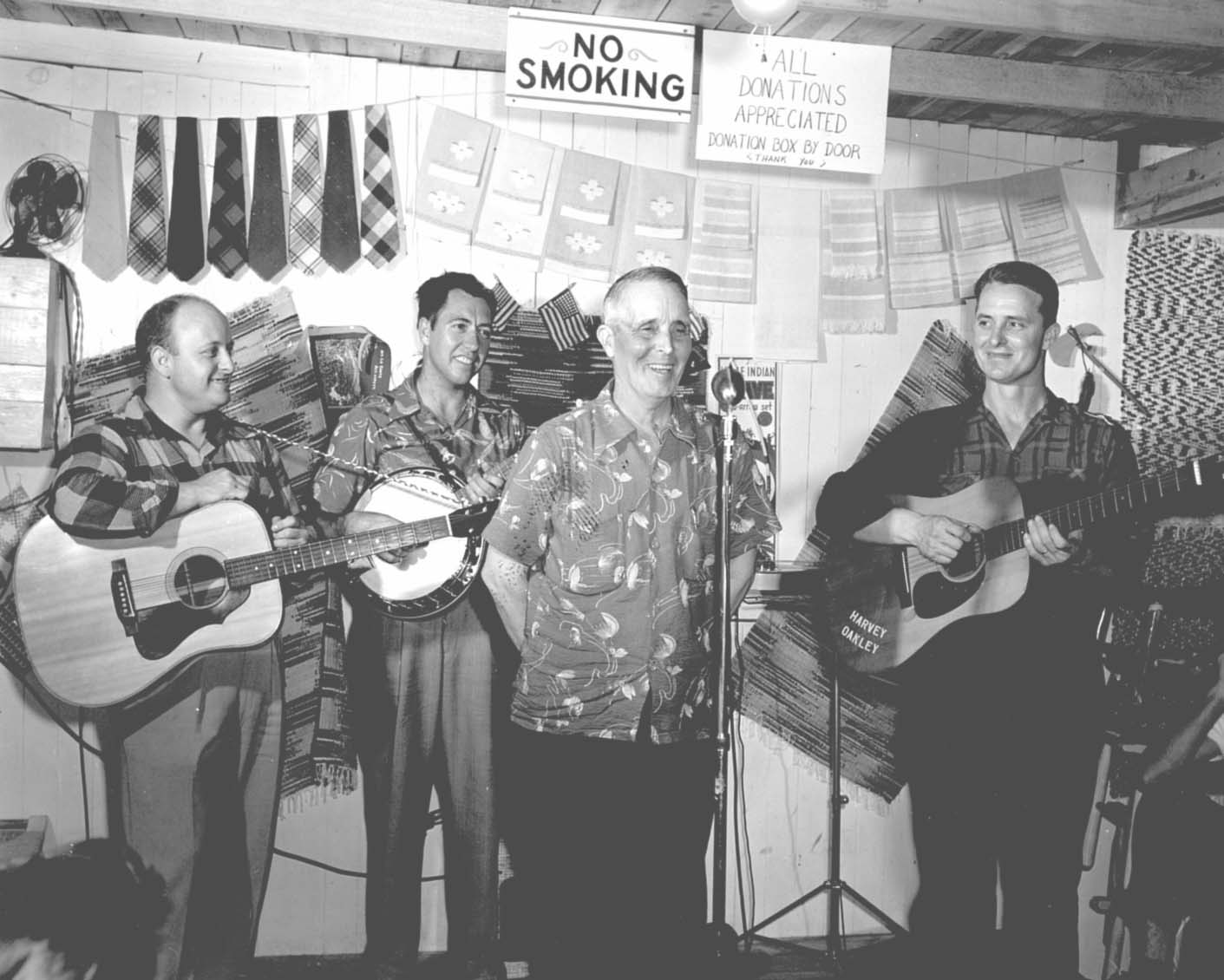

Harvey Oakley leaned forward in his chair and said, “One of my father’s favorite sayings was, ‘I’ve never been lost—just been bothered a few days. And I always got out!’”
My wife and I were in Harvey’s home in 2003 because I was presenting a talk about his father, Wiley Oakley, at an upcoming event, and I’d asked him to join me. It was a real treat to have several hours of insight about Wiley Oakley straight from his son.
As Harvey talked, I could see in his face the lean and aquiline features of his father. His dad was born in September 1885 near the base of Bullhead Mountain, a peak in the Smokies now referred to as Mount Le Conte. From his rustic beginnings, Wiley Oakley became a legendary guide, storyteller, author, businessman, and promoter of the Smokies until his death in 1954.
Harvey and wife Melba, along with Harvey’s sister Lucinda Ogle, had been instrumental in keeping the colorful story of Wiley Oakley alive over the decades since his death. Harvey had even portrayed his father in an outdoor theater production and at other public events in the Smokies area, dressing in a wool hat and red plaid shirt like his dad. He, Melba, and Lucinda had also kept Wiley’s book Roamin’ and Restin’ in print over the years, and Harvey even published his own book about his dad, Remembering the Roamin’ Man of the Mountains.

In his living room, Harvey reflected on his father’s love of the Smokies: “Dad’s mom died when he was just a boy. Missing her so much, he began roaming the mountains, thinking that if he climbed the highest peaks, he might catch a glimpse of his mother in heaven. He thought the pretty white clouds in the sky might be his mother’s flowing white robes ascending to heaven.
Thus began Wiley Oakley’s lifelong love of the Smokies.
Wiley grew into a true mountain man. He learned to farm, hunt, fish, and wander the mountains. Along the way, he acquired good knowledge of plants, trees, and animals, showing a genuine interest in them beyond their mere consumption.
The Smokies also gave Wiley Oakley the love of his life. At age 19, he met a mountain girl named Rebecca Ann Ogle of the Noah “Bud” Ogle family. They were married in January 1906 after making an unannounced nighttime call to the home of a local preacher. None too pleased with the unusual timing, the preacher refused to invite the couple in and instead had them slip paperwork and money through the door. Later, Wiley humorously related that they’d been married by an “invisible preacher.” For the rest of his life, he referred to Rebecca as his “golden-haired bride of Scratch-Britches Mountain.” The couple raised 12 children together.
Wiley ultimately got a job as a guide for the Mountain View Hotel in Gatlinburg, Tennessee, leading guests on hikes and tours into the Smokies. He also worked with the Civilian Conservation Corps on building trails when the park came about.

As a guide, Wiley discovered he had a talent for storytelling. His lilting Appalachian voice, vernacular expressions, and easy-going style made him a favorite among tourists, including many important visitors. In the 1930s, he and Rebecca opened a shop in Gatlinburg, Tennessee, called the Wiley Shop. There, they displayed a sign that humorously proclaimed, “Antiques Made to Order.” Inside, Wiley booked reservations for guided trips, sold crafts and souvenirs, and told stories, some identified as tall tales by a yodel.
As his fame grew, Oakley was asked to share his stories in print. He resisted, but finally wrote a periodic column, “Roamin’ with Wiley,” for the local newspaper. He wrote each story in pencil on blue-lined school paper. When his stories were published as written, he declared, “Lawd, the present generation will disown me for life—all that turrible spellin’and all!” He added that, “I’ve never been to school so I didn’t put in those colons or semi-colons. All I put was a period. And that means, catch your breath and start again!” His colorful stories can be found in his aforementioned book.
In addition to writing, Oakley toured cities on promotional trips and fortunately left his voice for posterity on several recordings. One of the best is “The Cow Barn,” a humorous tale about his honeymoon at a mountain cabin.

Wiley Oakley remained an institution in the Smokies until his death. Today, he’s memorialized by books, a monument outside the Gatlinburg Welcome Center, and by the nearby Wiley Oakley Drive. Thanks to the work of Harvey and Melba Oakley and Lucinda Ogle (all now deceased), Wiley Oakley’s colorful life story is preserved. Like his mother’s spirit, his story is still roamin’ the peaks of the Smoky Mountains.
Arthur “Butch” McDade retired from Great Smoky Mountains National Park as a park ranger. He’s the author of Old Smoky Mountain Days and The Natural Arches of the Big South Fork. Additionally, he’s a contributing writer to the Encyclopedia of Appalachia, and he’s written over 50 feature articles for numerous magazines. He is currently a contributing writer for Smoky Mountain Living and Smokies Life, as well as the Smokies LIVE blog. He lives with his wife and their rescued dogs and cats on the edge of the Smokies.
Subscribe to get the latest posts sent to your email.
The Great Smokies Welcome Center is located on U.S. 321 in Townsend, TN, 2 miles from the west entrance to Great Smoky Mountains National Park. Visitors can get information about things to see and do in and around the national park and shop from a wide selection of books, gifts, and other Smokies merchandise. Daily, weekly, and annual parking tags for the national park are also available.